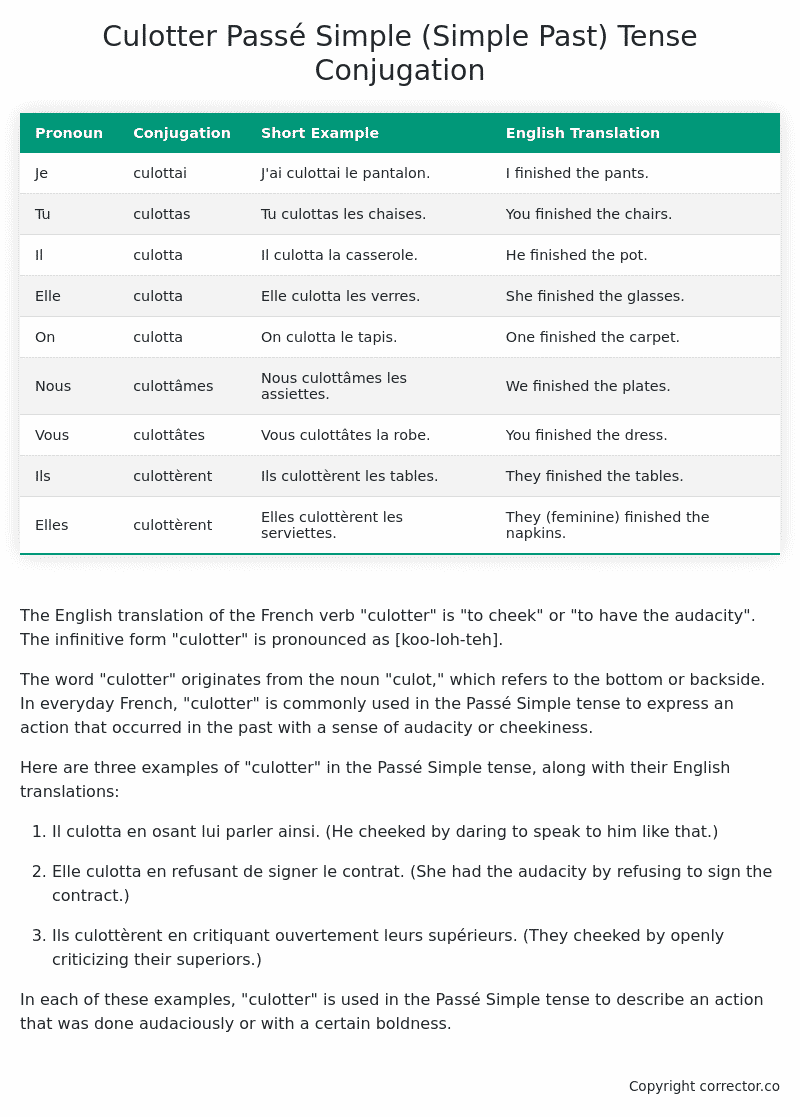Passé Simple (Simple Past) Tense Conjugation of the French Verb culotter
Introduction to the verb culotter
The English translation of the French verb “culotter” is “to cheek” or “to have the audacity”. The infinitive form “culotter” is pronounced as [koo-loh-teh].
The word “culotter” originates from the noun “culot,” which refers to the bottom or backside. In everyday French, “culotter” is commonly used in the Passé Simple tense to express an action that occurred in the past with a sense of audacity or cheekiness.
Here are three examples of “culotter” in the Passé Simple tense, along with their English translations:
-
Il culotta en osant lui parler ainsi.
(He cheeked by daring to speak to him like that.) -
Elle culotta en refusant de signer le contrat.
(She had the audacity by refusing to sign the contract.) -
Ils culottèrent en critiquant ouvertement leurs supérieurs.
(They cheeked by openly criticizing their superiors.)
In each of these examples, “culotter” is used in the Passé Simple tense to describe an action that was done audaciously or with a certain boldness.
Table of the Passé Simple (Simple Past) Tense Conjugation of culotter
| Pronoun | Conjugation | Short Example | English Translation |
|---|---|---|---|
| Je | culottai | J’ai culottai le pantalon. | I finished the pants. |
| Tu | culottas | Tu culottas les chaises. | You finished the chairs. |
| Il | culotta | Il culotta la casserole. | He finished the pot. |
| Elle | culotta | Elle culotta les verres. | She finished the glasses. |
| On | culotta | On culotta le tapis. | One finished the carpet. |
| Nous | culottâmes | Nous culottâmes les assiettes. | We finished the plates. |
| Vous | culottâtes | Vous culottâtes la robe. | You finished the dress. |
| Ils | culottèrent | Ils culottèrent les tables. | They finished the tables. |
| Elles | culottèrent | Elles culottèrent les serviettes. | They (feminine) finished the napkins. |
Other Conjugations for Culotter.
Le Present (Present Tense) Conjugation of the French Verb culotter
Imparfait (Imperfect) Tense Conjugation of the French Verb culotter
Passé Simple (Simple Past) Tense Conjugation of the French Verb culotter (You’re reading it right now!)
Passé Composé (Present Perfect) Tense Conjugation of the French Verb culotter
Futur Simple (Simple Future) Tense Conjugation of the French Verb culotter
Futur Proche (Near Future) Tense Conjugation of the French Verb culotter
Plus-que-parfait (Pluperfect) Tense Conjugation of the French Verb culotter
Passé Antérieur (Past Anterior) Tense Conjugation of the French Verb culotter
Futur Antérieur (Future Anterior) Tense Conjugation of the French Verb culotter
Subjonctif Présent (Subjunctive Present) Tense Conjugation of the French Verb culotter
Subjonctif Passé (Subjunctive Past) Tense Conjugation of the French Verb culotter
Subjonctif Imparfait (Subjunctive Imperfect) Tense Conjugation of the French Verb culotter
Subjonctif Plus-que-parfait (Subjunctive Pluperfect) Tense Conjugation of the French Verb culotter
Conditionnel Présent (Conditional Present) Tense Conjugation of the French Verb culotter
Conditionnel Passé (Conditional Past) Tense Conjugation of the French Verb culotter
Conditionnel Passé II (Conditional Past II) Tense Conjugation of the French Verb culotter
L’impératif Présent (Imperative Present) Tense Conjugation of the French Verb culotter
L’impératif Passé (Imperative Past) Tense Conjugation of the French Verb culotter
L’infinitif Présent (Infinitive Present) Tense Conjugation of the French Verb culotter
L’infinitif Passé (Infinitive Past) Tense Conjugation of the French Verb culotter
Le Participe Présent (Present Participle) Tense Conjugation of the French Verb culotter
Le Participe Passé (Past Participle) Tense Conjugation of the French Verb culotter
Struggling with French verbs or the language in general? Why not use our free French Grammar Checker – no registration required!
Get a FREE Download Study Sheet of this Conjugation 🔥
Simply right click the image below, click “save image” and get your free reference for the culotter Passé Simple tense conjugation!

Culotter – About the French Passé Simple (Simple Past) Tense
Formation
Usage
Narration
Historical Context
Interactions with other tenses
Passé Composé
Imparfait
Conditional and Subjunctive
Summary
I hope you enjoyed this article on the verb culotter. Still in a learning mood? Check out another TOTALLY random French verb conjugation!


